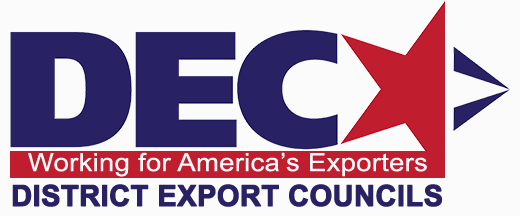District Export Councils (DECs) are organizations of leaders from the local business community, appointed by successive Secretaries of Commerce, whose knowledge of international business provides a source of professional advice for local firms.
–
What is a DEC?
For 30 years, DECs have served the United States by assisting companies in their local communities export, thus promoting our country’s economic growth and creating new and higher-paying jobs for their communities. Closely affiliated with the Commerce Department’s U.S. Export Assistance Centers, the 58 DECs combine the energies of nearly 1,500 exporters and export service providers who support the U.S. Government’s export promotion efforts throughout the country.
DEC members volunteer their time to sponsor and participate in numerous trade promotion activities. They also supply specialized expertise to small and medium sized businesses that are interested in exporting. Each DEC’s Executive Committee works with the membership to create an annual strategic plan that involves all members in mission fulfillment.
What is the DEC Mission?
The District Export Councils contribute leadership and international trade expertise to complement the U.S. Commercial Service’s export promotion efforts through counseling businesses on the exporting process and conducting trade education and community outreach.
DECs support their mission through funds that are generated locally, without any government appropriations, and follow the general guidelines in the DEC Handbook. DECs may not raise funds for profit, or represent the U.S. Government.
How Were DECs Formed?
In 1960, the President asked the Secretary of Commerce to enlist the efforts of the U.S. business community in enlarging export opportunities for American firms. Responding to this challenge, the National Export Expansion Council was formed.
In response to National Export Expansion Council recommendations and to stimulate greater business participation in the national export expansion effort, the President signed an Executive Order in 1973 that directed the Secretary of Commerce to establish District Export Councils throughout the United States.
Under the authority of the U.S. Department of Commerce, 41 DECs were established by the Secretary of Commerce in 1974. Approximately 1,000 business and trade experts were appointed to serve on the newly formed DECs. Since then, the number of DECs and DEC membership has been expanded to better meet the needs of the growing number of U.S. exporters.
Under the Secretary’s guidelines, the District Export Councils were specifically created to promote exports in their local communities. DECs are not advisory committees and are not subject to the Federal Advisory Committee Act (FACA). As a volunteer group, DECs do not receive government appropriations or compensation. They also do not have access to classified information and therefore, do not have security clearances.
Who are DEC Members?
Each DEC has approximately 30 members, at least half of whom are exporters. Members also include export trading or management company representatives; bankers; international lawyers and accountants; freight forwarders; and others whose profession supports the U.S. government’s export promotion mission.
Recommendations for appointment are based on the individual’s position in the local business community, knowledge of day-to-day international operations, interest in export development, and willingness and ability to devote time to the council — at his or her own expense.
How Are Members Appointed?
Notices requesting applications for nomination are placed in the Federal Register and elsewhere to attract new nominees. The local USEAC Director, in consultation with USEAC staff, other DEC members and local partner organizations recommends individuals for membership.
A fair and transparent review and appointment process is conducted within Commerce, and the Secretary makes the final decision on all membership and leadership appointments. Members are appointed by the Secretary of Commerce to staggered four-year terms. There are no term limits.
